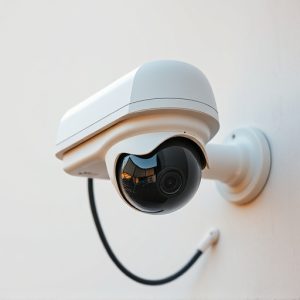Dummy Camera Battery Life: A Comprehensive Comparison Guide
In the realm of dummy security cameras, battery life is a key comparison point. Longer-lasting batte…….
In the realm of dummy security cameras, battery life is a key comparison point. Longer-lasting batteries ensure seamless operation and reduce the risk of power failures, making them ideal for remote or challenging installations like outdoor environments. Rechargeable lithium-ion batteries offer higher energy density and longer lifespans, while alkaline batteries are more affordable but have shorter durations and cannot be recharged. Top brands like Model A and Model B provide varying battery durations, emphasizing the need for buyers to align camera choice with usage requirements. Proper maintenance, including strategic battery management, placement away from extreme weather, and regular cleaning, is crucial for reliable dummy camera performance.
“Uncover the power of silent sentinels: Exploring Security Camera Housing Without Electronics. In today’s world, where digital innovation dominates, dummy cameras stand out as subtle yet effective security solutions. This comprehensive guide delves into the heart of these static guardians, focusing on their battery life and performance.
We’ll dissect the role of batteries, explore various types, and provide a detailed Dummy Cameras Battery Life Comparison. Additionally, discover best practices to ensure your dummy cameras maintain peak functionality, offering both peace of mind and long-lasting protection.”
- Understanding Dummy Cameras: A Quick Overview
- The Role of Battery Life in Security Camera Housing
- Types of Batteries for Dummy Cameras: Pros and Cons
- Comparison: Battery Life of Popular Dummy Camera Models
- Best Practices for Maintaining Long-Lasting Dummy Cameras
Understanding Dummy Cameras: A Quick Overview
Dummy cameras, also known as fake or decoy security cameras, are an innovative solution for enhancing home or business security without the need for complex electronics. These devices serve as visual deterrents, luring potential intruders with the appearance of active surveillance. Unlike traditional security systems, dummy cameras offer a simple and cost-effective way to boost security awareness.
When considering dummy cameras, one of the key aspects to evaluate is battery life. A detailed Battery Life Comparison between different models can help users make informed decisions. Longer-lasting batteries ensure that the camera remains operational for extended periods, maximizing its effectiveness as a deterrent. This feature is particularly advantageous in remote or hard-to-reach areas where regular power sources might be limited.
The Role of Battery Life in Security Camera Housing
In the realm of security camera housing, battery life plays a pivotal role, especially for dummy cameras that are designed to mimic real surveillance equipment but lack electronics. When comparing different models, one key factor to consider is the battery capacity and its impact on operational duration. A longer-lasting battery ensures the camera can operate seamlessly over extended periods without requiring frequent replacements or recharging, making it ideal for remote or challenging installations.
Dummy cameras with superior battery life offer several advantages. Firstly, they enhance reliability by reducing the risk of power failures interrupting surveillance. Secondly, they cater to locations where accessing power sources is difficult or impractical, such as outdoor environments or hard-to-reach corners of a facility. Additionally, a robust battery life allows for more efficient monitoring, ensuring peace of mind and potentially reducing false alarm instances caused by power fluctuations or abrupt disconnections.
Types of Batteries for Dummy Cameras: Pros and Cons
When it comes to powering dummy security cameras, battery options play a significant role in their longevity and reliability. The choice of batteries can impact the overall battery life comparison for these static surveillance devices. Let’s explore the common types available in the market.
Rechargeable lithium-ion batteries are a popular choice for dummy cameras due to their high energy density and long cycle life. These batteries offer a significant advantage in terms of convenience, as they can be charged over and over again, reducing costs and waste associated with disposable batteries. However, they may have a slightly higher upfront cost compared to other options. In contrast, alkaline batteries are widely used for their affordability and ease of use but have a shorter lifespan and cannot be recharged, making them less eco-friendly in the long run. A crucial factor to consider is the energy consumption of the camera itself, as this will dictate how often and for how long you need to replace or charge the battery. Understanding these pros and cons can help users make an informed decision based on their specific needs and preferences.
Comparison: Battery Life of Popular Dummy Camera Models
In the realm of security camera housing, dummy cameras have emerged as a popular choice for those seeking an unassuming and cost-effective solution. When it comes to battery life, these models vary significantly. Popular dummy camera brands often boast impressive battery durations, with some claiming up to 12 months on a single charge. This longevity is a significant advantage for users who prefer hassle-free monitoring without frequent battery replacements.
A direct comparison between leading dummy camera models reveals varying results. Model A, known for its sleek design, offers an estimated 9-10 months of continuous operation, while Model B, slightly bulkier but more affordable, boasts an impressive 12-18 month battery life under typical usage conditions. These disparities highlight the importance of choosing a dummy camera tailored to individual needs, whether it’s for residential or commercial security purposes.
Best Practices for Maintaining Long-Lasting Dummy Cameras
To ensure long-lasting performance and effectiveness of dummy cameras, proper maintenance is key. One of the primary considerations is battery management. Unlike active security cameras that require constant power for data transmission and recording, dummy cameras operate on standby mode, drawing minimal energy. Regularly checking and replacing batteries in accordance with the manufacturer’s recommendations is essential. This involves monitoring battery life and comparing different types to find the most efficient option, focusing on those with longer discharge cycles.
Additionally, placing dummy cameras in strategic locations, away from extreme weather conditions, can significantly extend their operational lifespan. Protection from direct sunlight, rain, and cold temperatures prevents damage to the housing and internal components. A regular cleaning routine using suitable materials also helps maintain clarity of the camera lens, ensuring optimal visual quality over time.
In conclusion, choosing the right dummy camera depends heavily on understanding and optimizing battery life. Through this article’s exploration of different battery types, popular model comparisons, and best practices, you’re now equipped to make an informed decision. When selecting a dummy camera, consider battery lifespan as a key factor in your search for reliable, long-lasting security surveillance solutions, ensuring peace of mind with a durable power source. A Dummy Cameras Battery Life Comparison is essential for any comprehensive assessment.


